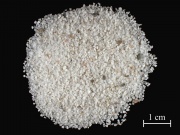Difference between revisions of "Sand"
Jump to navigation
Jump to search
(username removed) |
m (Text replace - "== Authority ==" to "== Sources Checked for Data in Record ==") |
||
| Line 18: | Line 18: | ||
| − | == | + | == Sources Checked for Data in Record == |
* G.S.Brady, ''Materials Handbook'', McGraw-Hill Book Co., New York, 1971 Comment: p. 687 | * G.S.Brady, ''Materials Handbook'', McGraw-Hill Book Co., New York, 1971 Comment: p. 687 | ||
Revision as of 18:10, 1 May 2016
Description
Small, loose grains of rock ranging in size from 0.6 to 2.0 millimeters. Sand is primarily compose of quartz (SiO2), but may also contain small amounts of mica, feldspar, hematite, and nonsoluble salts. It is used as an abrasive, a filter media and an ingredient in glass, ceramics, and concrete.
Synonyms and Related Terms
arena (Esp.); sable (Fr.); areia (Port.); Sand (Deut.); zand (Ned.)
Other Properties
Particle sizes from 0.05 - 2.0 millimeters
Comparisons
Properties of Common Abrasives
Sources Checked for Data in Record
- G.S.Brady, Materials Handbook, McGraw-Hill Book Co., New York, 1971 Comment: p. 687
- Hoechst Celanese Corporation, Dictionary of Fiber & Textile Technology (older version called Man-made Fiber and Textile Dictionary, 1965), Hoechst Celanese Corporation, Charlotte NC, 1990
- Michael McCann, Artist Beware, Watson-Guptill Publications, New York City, 1979
- Dictionary of Building Preservation, Ward Bucher, ed., John Wiley & Sons, Inc., New York City, 1996
- Random House, Webster's Encyclopedic Unabridged Dictionary of the English Language, Grammercy Book, New York, 1997
- The American Heritage Dictionary or Encarta, via Microsoft Bookshelf 98, Microsoft Corp., 1998
